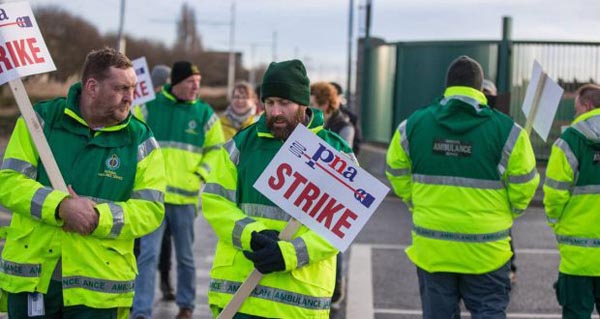Katia Hancke, Socialist Party Ireland
International Day of Solidarity – Monday 21 st October
Ambulance workers in the South of Ireland have been organising in NASRA, a branch of the Psychiatric Nurses Association (PNA), for the last ten years. The grassroots union branch is democratic with a lay leadership and a fighting approach to defending workers’ rights. Over the last ten years the union membership has grown and, by the autumn of 2018, NASRA was organising over 500 of the 1200 ambulance workers, the biggest union in the sector. Although NASRA has never been officially recognised as the union of choice of the ambulance personnel, union subs were deducted at source and NASRA would represent its members during negotiations over working conditions.

But the union has increasingly been seen as a threat that needs to be stopped – management, with the agreement of the Department of Health, decided to stop deducting union subs at source. This amounts to a de facto complete de-recognition of NASRA as the union of choice of ambulance workers. In response to this provocation, the NASRA organised workers balloted for industrial action.
Since the first day of strike action in January 2019, eight more strike actions escalating to 48-hour walk-outs have taken place. As emergency response workers, it is hard to organise effective strike action – even though the army has been called in, strikers, even those on picket lines, are still compelled to respond to calls when there is not enough cover. The refusal of the Ministry of Health to provide sufficient cover on strike days leaves the workers with no choice but to answer emergency calls.
During the years of austerity since 2008, ambulance services in Ireland have been cut to the bone and are now completely inadequate over vast swathes of the country. Working conditions have been undermined. A recent survey conducted by the Health Service Executive recorded an exceptionally high level of bullying of workers in the service. The problem is that SIPTU, the union that traditionally organised ambulance workers, also represents management and is actively competing with grassroots unions such as the PNA to ‘win’ sectoral agreements in the health service. This means the SIPTU bureaucracy takes a very conservative approach to workers’ issues rather than effectively fighting for better wages and conditions for the people they represent. This explains why NASRA has been able to grow to the size it is today, with a broad base of active members. It also explains why many SIPTU members have joined the picket lines in solidarity with their fellow workers.
As well as taking industrial action, NASRA has been putting the maximum pressure on the political establishment by organising days of protest both outside and inside the Dail, the Irish parliament. On one of these days, Socialist Party Members of Parliament (TDs) organised with NASRA to get 96 members into the Parliamentary chamber as their trade union recognition battle was being discussed. They then held an impromptu workers’ meeting in the Dail bar, which is normally populated just by Senators and TDs.
On 23rd October, ambulance workers will be outside the Dail to highlight their case again. We ask for International protests in support of their struggle to be held at Irish embassies or consulates around the world on the 21 st or 22 nd October to shame the government – inside and outside the Dail chamber. The slogan they have adopted, “My union, my choice”, is a positive reference to the movement for abortion rights that rocked Ireland over the last few years.
As the strike committee says, ‘we are fighting not just for the right to be organised in the union of our choice’. This fight is a marker for a new generation of workers in many other companies such as Ryanair, English Language Teachers, the hospitality sector, who are currently fighting similar battles. If even the government itself is not recognising unions, where does that leave private sector workers? Workers need effective representation that is led by the workforce themselves, places their interests first and is willing to take the action needed to fight for better wages and conditions. In order to achieve that, workers need to have the democratic right to be represented by the union of their choice, and that is exactly what this dispute is about.












